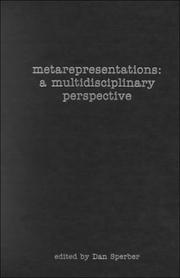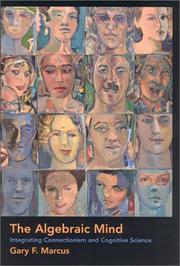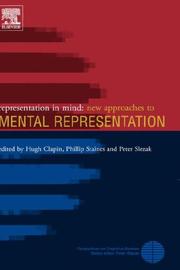| Listing 1 - 10 of 43 | << page >> |
Sort by
|
Book
ISBN: 1135625255 1410609537 Year: 2004 Publisher: Mahwah, NJ. : L. Erlbaum,
Abstract | Keywords | Export | Availability | Bookmark
 Loading...
Loading...Choose an application
- Reference Manager
- EndNote
- RefWorks (Direct export to RefWorks)
Strategy Representation: An Analysis of Planning Knowledge describes an innovative methodology for investigating the conceptual structures that underlie human reasoning. This work explores the nature of planning strategies--the abstract patterns of planning behavior that people recognize across a broad range of real world situations. With a sense of scale that is rarely seen in the cognitive sciences, this book catalogs 372 strategies across 10 different planning domains: business practices, education, object counting, Machiavellian politics, warfare, scientific discovery, personal rela
Mental representation. --- Planning. --- Reasoning (Psychology)
Book
ISBN: 1315521938 131552192X 9781315521923 9781138697324 113869732X 9781315521916 1315521911 9781315521909 1315521903 9781315521930 Year: 2017 Publisher: New York
Abstract | Keywords | Export | Availability | Bookmark
 Loading...
Loading...Choose an application
- Reference Manager
- EndNote
- RefWorks (Direct export to RefWorks)
Cognition. --- Mental representation. --- Human information processing.

ISBN: 026203235X 0262271036 058503107X 9780262271035 9780585031071 9780262032353 Year: 1996 Publisher: Cambridge, Mass. MIT
Abstract | Keywords | Export | Availability | Bookmark
 Loading...
Loading...Choose an application
- Reference Manager
- EndNote
- RefWorks (Direct export to RefWorks)
What is it for something in the mind to represent something? Robert Cummins looks at the familiar problems of representation theory (what information is represented in the mind, what form mental representation takes, how representational schemes are implemented in the brain, what it is for one thing to represent another) from an unprecedented angle. Instead of following the usual procedure of defending a version of "indicator" semantics, Cummins begins with a theory of representational error and uses this theory to constrain the account of representational content. Thus, the problem of misrepresentation, which plagues all other accounts, is avoided at the start. Cummins shows that representational error can be accommodated only if the content of a representation is intrinsic - independent of its use and causal role in the system that employs it. Cummins's theory of error is based on the teleological idea of a "target," an intentional concept but one that differs importantly from that of an ordinary intentional object. Using this notion he offers a schematic theory of representation and an account of propositional attitudes that takes exception with some popular positions, such as conceptual role semantics, Fodor's representational theory of the mind, and Putnam's twin-earth examples.
Philosophical anthropology --- Theory of knowledge --- Representation (Philosophy) --- Mental representation --- Philosophy & Religion --- Philosophy --- Representation, Mental --- Representationalism (Philosophy) --- Representationism (Philosophy) --- Abstraction --- Perception --- Culture --- Mental representation.

ISBN: 1280531185 0195349687 1429404809 9780195349689 0195141148 9780195141146 0195141156 9786610531189 6610531188 0197730876 Year: 2000 Publisher: Oxford ; New York : Oxford University Press,
Abstract | Keywords | Export | Availability | Bookmark
 Loading...
Loading...Choose an application
- Reference Manager
- EndNote
- RefWorks (Direct export to RefWorks)
This volume concerns metarepresentation: the construction and use of representations that represent other representations. It collects studies on the subject by an interdisciplinary group of contributors.
Mental representation --- Thought and thinking --- Cognitive science --- Representation, Mental --- Abstraction --- Perception --- Congresses
Book
ISBN: 1283436086 9786613436085 1443834130 9781443834131 Year: 2011 Volume: v. 4 Publisher: Newcastle upon Tyne Cambridge Scholars Publishing
Abstract | Keywords | Export | Availability | Bookmark
 Loading...
Loading...Choose an application
- Reference Manager
- EndNote
- RefWorks (Direct export to RefWorks)
It is supposed to be common knowledge in the history of ideas that one of the few medieval philosophical contributions preserved in modern philosophical thought is the idea that mental phenomena are distinguished from physical phenomena by their intentionality, their directedness toward some object. As is usually the case Other such commonplaces about the history of ideas, especially those concerning medieval ideas, this claim is not quite true. Medieval philosophers routinely described ordina...
Mental representation --- Logic, Medieval --- Ontology --- Medieval logic --- Representation, Mental --- Abstraction --- Perception

ISBN: 0262632683 0262133792 0262279088 0585480893 9780262279086 9780262133791 9780585480893 9780262632683 Year: 2001 Publisher: Cambridge (Mass.) MIT press
Abstract | Keywords | Export | Availability | Bookmark
 Loading...
Loading...Choose an application
- Reference Manager
- EndNote
- RefWorks (Direct export to RefWorks)
In The Algebraic Mind, Gary Marcus attempts to integrate two theories about how the mind works, one that says that the mind is a computer-like manipulator of symbols, and another that says that the mind is a large network of neurons working together in parallel. Resisting the conventional wisdom that says that if the mind is a large neural network it cannot simultaneously be a manipulator of symbols, Marcus outlines a variety of ways in which neural systems could be organized so as to manipulate symbols, and he shows why such systems are more likely to provide an adequate substrate for language and cognition than neural systems that are inconsistent with the manipulation of symbols. Concluding with a discussion of how a neurally realized system of symbol-manipulation could have evolved and how such a system could unfold developmentally within the womb, Marcus helps to set the future agenda of cognitive neuroscience.
Connectionism. --- Cognitive psychology --- Psycholinguistics --- Artificial intelligence. Robotics. Simulation. Graphics --- Cognition. --- Cognitive science. --- Mental representation. --- Social Sciences --- Psychology --- Science --- Philosophy of mind --- Connexionism --- Cognition --- Representation, Mental --- Abstraction --- Perception --- Cognitive science --- Connectionism --- Mental representation --- COGNITIVE SCIENCES/General --- COGNITIVE SCIENCES/Psychology/Cognitive Psychology
Book
ISSN: 03448142 ISBN: 1283628074 3110277352 9786613940520 9783110277357 9783110277234 3110277239 Year: 2012 Volume: Bd. 107 Publisher: Berlin Boston De Gruyter
Abstract | Keywords | Export | Availability | Bookmark
 Loading...
Loading...Choose an application
- Reference Manager
- EndNote
- RefWorks (Direct export to RefWorks)
Eine systematische Neubewertung der transzendentalen Phänomenologie Husserls vor der Folie aktueller Diskussionen in der Philosophie des Geistes steht unerachtet einiger neuerer Annäherungsversuche bislang aus. Die Arbeit lotet die Möglichkeiten, aber auch die methodologischen Grenzen eines solchen Brückenschlages aus. In detaillierten Analysen werden dabei gravierende konzeptuelle und metatheoretische Äquivokationen zwischen der phänomenologischen und den (sprach-)analytischen bzw. kognitivistischen Modellen des Mentalen aufgeklärt. Kritisch fokussiert werden insbesondere repräsentationalistische Projekte der Naturalisierung des phänomenalen und intentionalen Bewusstseins, neuere Selbstbewusstseinstheorien sowie Husserls Sonderstellung gegenüber der semantischen und geisttheoretischen Internalismus/Externalismus- und der Realismus/Anti-Realismus-Debatte. Die Studie zeigt so das deskriptive und explanatorische Potenzial von Husserls Bewusstseinstheorie auf und präsentiert die Phänomenologie als ernstzunehmende Diskussionspartnerin nicht nur der Philosophie des Geistes und der Kognition, sondern auch der analytischen Sprachphilosophie und Erkenntnistheorie.
Intentionality (Philosophy) --- Phenomenology. --- Mental representation. --- Representation, Mental --- Abstraction --- Perception --- Philosophy, Modern --- Act (Philosophy) --- Mind and body --- Philosophy --- Husserl, Edmund, --- Husserl, Edmund --- Husserl, Edmond --- Phenomenology --- Mental representation --- Husserl, Edmund, - 1859-1938 --- Husserl, Edmund. --- Intentionality. --- cognition. --- consciousness. --- phenomenology.

ISBN: 008044394X 9781435604018 1435604016 9780080443942 9786611046194 1281046191 008054052X Year: 2004 Publisher: Amsterdam Boston Elsevier
Abstract | Keywords | Export | Availability | Bookmark
 Loading...
Loading...Choose an application
- Reference Manager
- EndNote
- RefWorks (Direct export to RefWorks)
'Representation in Mind' is the first book in the new series 'Perspectives on Cognitive Science' and includes well known contributors in the areas of philosophy of mind, psychology and cognitive science.The papers in this volume offer new ideas, fresh approaches and new criticisms of old ideas. The papers deal in new ways with fundamental questions concerning the problem of mental representation that one contributor, Robert Cummins, has described as ""THE problem in philosophy of mind for some time now"". The editors' introductory overview considers the problem for which mental represe
Cognitive psychology --- Psycholinguistics --- Mental representation --- Perception. --- Supraliminal perception --- Cognition --- Apperception --- Senses and sensation --- Thought and thinking --- Representation, Mental --- Abstraction --- Perception
Book
ISBN: 1443875767 1336096675 9781336096677 9781443875769 9781443870467 Year: 2015 Publisher: Newcastle upon Tyne, England : Cambridge Scholars Publishing,
Abstract | Keywords | Export | Availability | Bookmark
 Loading...
Loading...Choose an application
- Reference Manager
- EndNote
- RefWorks (Direct export to RefWorks)
This book clarifies a thorny and knotty problem that has interfered with clear thinking among psychoanalysts for over 70 years. It provides a rigorous examination of the views, theories and contributions of psychoanalysts since their initial appearance, to very mixed acclaim, among the experimental psychoanalysts who were struggling professionally in war-torn London in the early 1940s. Extensive details of the data and their analysis have been included so that the scientific basis of the work's conclusion may be understood and appreciated. Psychoanalysis is replete with theories, but not so much evidence. This book, however, produces evidence for scrutiny and, as such, provides new evidence-based knowledge about psychoanalytic phenomena in everyday life as it is commonly understood, and which is not derived from "research on the couch". The conclusions drawn in the book include the new knowledge that mental representations and internal objects do both occur in everyday life and can co-exist.
Mental representation --- Object relations (Psychoanalysis) --- Object relations theory (Psychoanalysis) --- Psychoanalysis --- Interpersonal relations --- Representation, Mental --- Abstraction --- Perception --- Social aspects.
Book
ISBN: 9781783740741 9781783740758 1783740744 9781783740734 9781783740727 1783740752 9781783740765 1783740760 282187619X Year: 2014 Publisher: Cambridge OpenBook Publishers
Abstract | Keywords | Export | Availability | Bookmark
 Loading...
Loading...Choose an application
- Reference Manager
- EndNote
- RefWorks (Direct export to RefWorks)
"It's a platitude - which only a philosopher would dream of denying - that whereas words are connected to what they represent merely by arbitrary conventions, pictures are connected to what they represent by resemblance. The most important difference between my portrait and my name, for example, is that whereas my portrait and I are connected by my portrait's resemblance to me, my name and I are connected merely by an arbitrary convention. The first aim of this book is to defend this platitude from the apparently compelling objections raised against it, by analysing depiction in a way which reveals how it is mediated by resemblance. It's natural to contrast the platitude that depiction is mediated by resemblance, which emphasises the differences between depictive and descriptive representation, with an extremely close analogy between depiction and description, which emphasises the similarities between depictive and descriptive representation. Whereas the platitude emphasises that the connection between my portrait and me is natural in a way the connection between my name and me is not, the analogy emphasises the contingency of the connection between my portrait and me. Nevertheless, the second aim of this book is to defend an extremely close analogy between depiction and description. The strategy of the book is to argue that the apparently compelling objections raised against the platitude that depiction is mediated by resemblance are manifestations of more general problems, which are familiar from the philosophy of language. These problems, it argues, can be resolved by answers analogous to their counterparts in the philosophy of language, without rejecting the platitude. So the combination of the platitude that depiction is mediated by resemblance with a close analogy between depiction and description turns out to be a compelling theory of depiction, which combines the virtues of common sense with the insights of its detractors."--Publisher's website.
Representation (Philosophy) --- Mental representation. --- Representation, Mental --- Abstraction --- Perception --- Representationalism (Philosophy) --- Representationism (Philosophy) --- Culture --- Philosophy --- language --- Myself --- portrait --- representation
| Listing 1 - 10 of 43 | << page >> |
Sort by
|

 Search
Search Feedback
Feedback About UniCat
About UniCat  Help
Help News
News